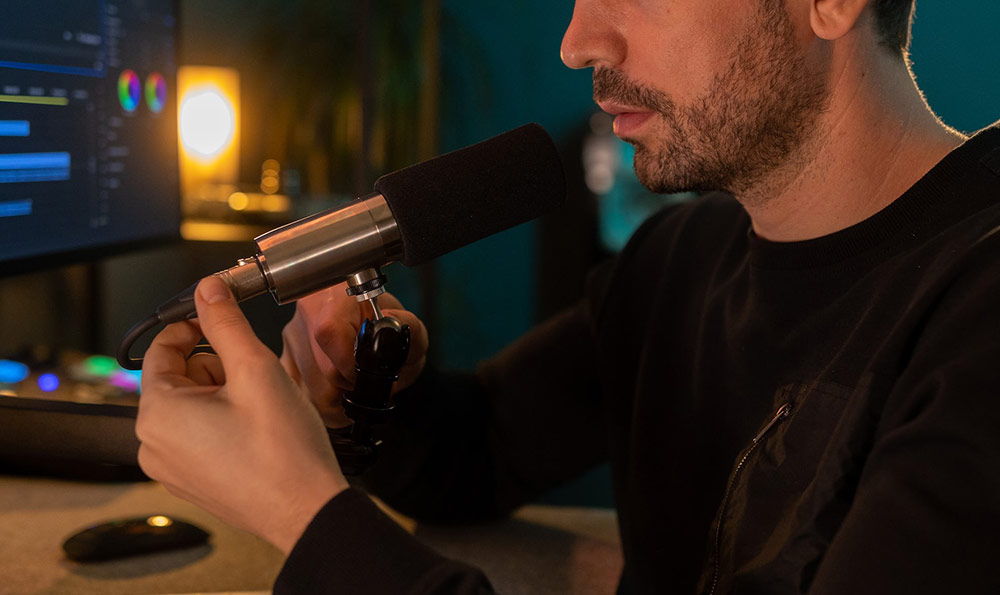我是旁白英文怎么读,磁性旁白配音英文翻译,老铁们想知道有关这个问题的分析和解答吗,相信你通过以下的文章内容就会有更深入的了解,那么接下来就跟着我们的小编一起看看吧。
I am the Voiceover: How to Pronounce "Narrator" and Translate Magnetic Voiceover

Introduction:
The world of voiceover narration is a captivating industry that relies on skilled individuals to bring stories to life. In this article, we will explore the pronunciation of "narrator" and delve into the translation of magnetic voiceover. By examining the importance of a distinct voice and the impact it has on various mediums, we can gain a deeper understanding of this intriguing profession.
1. The Art of Pronouncing "Narrator":
The pronunciation of "narrator" holds significance in the voiceover industry. The correct pronunciation is "nuh-rey-ter," with the emphasis on the second syllable. This term refers to the individual responsible for conveying the storyline, guiding the audience through various emotions, and providing coherence to the overall narrative.
2. The Magnetic Voiceover:
The term "magnetic voiceover" encapsulates the ability of a voice to captivate and engage listeners. This quality is sought after in industries such as advertising, film, audiobooks, and documentaries. A magnetic voiceover possesses an irresistible allure, drawing the audience into the story being told, leaving a lasting impact.
3. The Impact on Different Mediums:
a) Advertising: In the advertising industry, a magnetic voiceover can make a significant difference in capturing the attention of consumers. A well-delivered narration can evoke emotions and create a memorable connection between the brand and its audience.
b) Film: In movies, the narrator plays a crucial role in setting the tone and providing insights into characters' thoughts and motivations. A magnetic voiceover can enhance the overall cinematic experience, adding depth and richness to the storytelling.
c) Audiobooks: Audiobooks rely heavily on voiceover narration to bring written stories to life. A magnetic voiceover can transport listeners into the world of the book, making it a compelling and immersive experience.
d) Documentaries: Documentaries often employ a narrator to guide viewers through complex subject matters. A magnetic voiceover can add credibility to the information presented, making it more engaging and memorable.
4. The Desired Qualities of a Narrator:
a) Clarity and Diction: A skilled narrator must have clear enunciation and impeccable diction. Every word should be articulated flawlessly and with precision.
b) Expressiveness: A magnetic voiceover is not simply about saying the words but also conveying the emotions and intentions behind them. An expressive narrator adds depth and authenticity to the storytelling.
c) Versatility: A successful narrator can adapt their voice to suit different genres and mediums. Whether it's a dramatic narrative or a lighthearted commercial, the ability to be versatile is highly valued in the industry.
5. The Future of Voiceover Narration:
The world of voiceover narration is evolving rapidly with advancements in technology. Thanks to artificial intelligence, synthetic voices have become more commonplace. While these voices can mimic human speech, the human touch and nuanced emotions of a magnetic voiceover remain irreplaceable in creating an emotional connection with the audience.
Conclusion:
The role of a narrator goes beyond mere recitation; it is an art that requires skill, passion, and the ability to engage an audience. By understanding the pronunciation of "narrator" and the concept of magnetic voiceover, we can appreciate the impact it has on different mediums. As the industry continues to evolve, the demand for talented voiceover artists who can bring stories to life will undoubtedly remain strong.
旁白叙述者用英语怎么说

The Narrator: What is the English term for "旁白叙述者"?
Introduction:
In the realm of performance arts, the role of the narrator holds a special place. Whether it be in theater, film, or literature, the narrator serves as the guide, the storyteller, who leads the audience through the unfolding narrative. However, have you ever wondered how this figure is referred to in the English language? In this article, we will explore the various terms used to describe the narrator, shedding light on their significance and impact.
Part I: The Narrator's Role and Importance
The narrator plays a crucial role in any production, as they provide the audience with crucial insights, explanations, and interpretations. Their narration sets the tone and pace of the narrative, capturing the audience's attention from the very beginning. Often, the narrator becomes the bridge between the characters and the viewers, offering a unique perspective and guiding them through the story's twists and turns.
Part II: The Voice of Authority - The Voice-Over Artist
In the film and television industry, the term often used to describe the narrator is a "voice-over artist." These individuals possess a captivating voice, capable of capturing the audience's attention and immersing them in the story. Voice-over artists are skilled in delivering lines with precise emphasis, tone, and timing, breathing life into the characters and narrative. Their ability to convey emotions, build tension, and evoke powerful imagery distinguishes them as masters of their craft.
Part III: The Invisible Storyteller - The Unseen Narrator
In theater and literature, the narrator is often described as being "unseen" or "invisible." This term highlights the fact that the narrator's presence is felt through their words, not their physical appearance. Through their storytelling abilities, they paint vivid pictures, transporting the audience into different worlds and eras, without the need for visual aids. Their words possess the power to evoke emotions, create tension, and establish a connection between the characters and the audience.
Part IV: The Reliable Guide - The Omniscient Narrator
In some narratives, the narrator assumes an all-knowing position, providing the audience with insights into the characters' thoughts, motivations, and actions. Referred to as the "omniscient narrator," this voice serves as a reliable guide, offering an unbiased perspective on the story. Their omniscience allows them to unravel the complexities of the plot, providing the audience with a deeper understanding of the characters' intentions and the overall message.
Part V: The Storytelling Artistry - The Narrative Voice
Beyond these specific terms, the overall concept of the narrator is encompassed by the phrase "narrative voice." This term embodies the artistry and skill required to bring a story to life. The narrative voice combines the techniques of pacing, tone, and characterization to create a truly immersive experience for the audience. It is through this narrative voice that the story finds its unique identity, capturing the hearts and minds of those who listen.
Conclusion:
In the world of storytelling, the narrator serves as a guide, a connector, and a storyteller extraordinaire. Whether referred to as a voice-over artist, an unseen narrator, an omniscient guide, or simply the narrative voice, their role is of utmost importance. Their ability to capture the audience's attention, evoke emotions, and create a lasting impact is a testament to the power of words. So, the next time you find yourself immersed in a story, take a moment to appreciate the magic of the narrator, the unsung hero behind the scenes.
我是旁白英文怎么读

I am the Narrator: How Do You Pronounce My Name?
Introduction:
In the world of language, pronunciation plays a vital role. It not only reflects our understanding of a certain language but also presents our cultural identity. In this article, we will delve into the question of how to pronounce the English word "narrator," specifically discussing its correct pronunciation, its importance, and how it impacts various industries.
Part 1 - The Origin of "Narrator":
The word "narrator" originates from the Latin word "narrare," meaning "to narrate" or "to tell." The pronunciation of "narrator" follows the standard English phonetic rules, with the emphasis on the second syllable. The correct pronunciation is "NA-ruh-tur." It is essential to pronounce it accurately to ensure effective communication, especially in fields where storytelling and narration are significant.
Part 2 - The Influence of Correct Pronunciation:
The correct pronunciation of "narrator" holds immense importance in literature, theater, and film industries. A skilled narrator breathes life into a story, captivating audiences with their expressive and articulate delivery. Mispronouncing the word disrupts the flow and credibility of the narrative, diminishing its impact and entertainment value.
Part 3 - Pronunciation in Audiobooks and Podcasts:
Audiobooks and podcasts have gained immense popularity in recent years. The effectiveness of these audio mediums heavily relies on the pronunciation skills of the narrator. An accurately pronounced "narrator" not only ensures comprehension but also adds authenticity and professionalism to the listening experience, leaving a lasting impression on the audience.
Part 4 - Pronunciation in Documentary Films and Presentations:
Documentary films and presentations often rely on narration to convey information and engage viewers. A well-pronounced word "narrator" helps the audience connect with the content, comprehend complex ideas, and retain information effectively. Inaccurate pronunciation can lead to confusion and hinder the intended impact of the narrative.
Part 5 - Pronunciation in Language Learning Materials:
In the field of language learning, accurate pronunciation is crucial for learners to acquire and reproduce correct sounds and intonations. The word "narrator" frequently appears in language learning materials, such as audio lessons and language practice exercises. Pronouncing it correctly aids learners in developing their listening skills and mimicking native speakers' pronunciation.
Conclusion:
The correct pronunciation of "narrator" plays a crucial role in various industries, including literature, theater, film, audiobooks, podcasts, documentaries, language learning, and more. It ensures effective communication, enhances the credibility of the narrative, and contributes to a captivating and immersive experience for the audience. So, the next time you come across the word "narrator," remember its correct pronunciation - "NA-ruh-tur," and embrace the power of storytelling.
我是旁白英文怎么读,磁性旁白配音英文翻译的问题分享结束啦,以上的文章解决了您的问题吗?欢迎您下次再来哦!
免责声明:以上整理自互联网,与本站无关。其原创性以及文中陈述文字和内容未经本站证实,对本文以及其中全部或者部分内容、文字的真实性、完整性、及时性本站不作任何保证或承诺,请读者仅作参考,并请自行核实相关内容。(我们重在分享,尊重原创,如有侵权请联系在线客服在24小时内删除)
-
 英语配音工作怎么找,英文电影配音员工作88人浏览
英语配音工作怎么找,英文电影配音员工作88人浏览 -
 英文电影动画,比较简单的英文动画片配音91人浏览
英文电影动画,比较简单的英文动画片配音91人浏览 -
 抖音AK47英文段子,抖音话剧英文配音88人浏览
抖音AK47英文段子,抖音话剧英文配音88人浏览














